4 Symptoms of a Bad Clutch Master Cylinder (and Replacement Cost)
A clutch master cylinder links your left foot to the clutch in a three pedaled vehicle with a hydraulic clutch. If the master cylinder has completely failed, it will likely leave you stranded, unless you can figure out a way to limp home without the use of the clutch.
Fortunately, the most common symptoms of a faulty clutch master cylinder is leaking clutch fluid and other noticeable signs. Once these things are noticed, you’ll want to get it replaced ASAP. Keep reading to see how much that will cost.
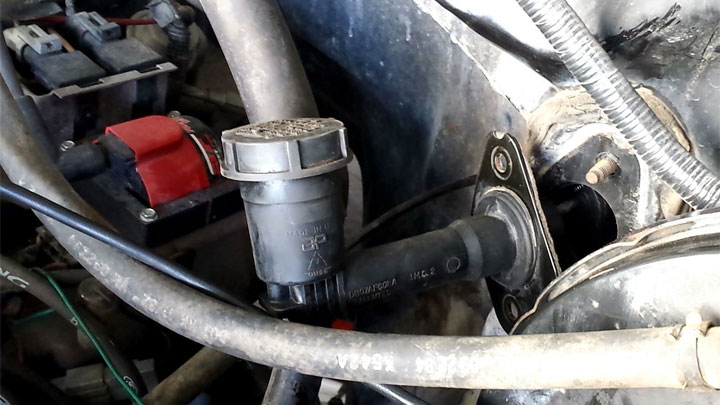
Related: 8 Symptoms of a Bad Clutch Slave Cylinder
Bad Clutch Master Cylinder Symptoms
Here are four of the most common signs your clutch master cylinder is starting to fail or has already completely failed. Note that the following are likely only helpful if you have a hydraulic clutch problem, and don’t apply to a cable operated clutch system.
#1 – Low Clutch Fluid
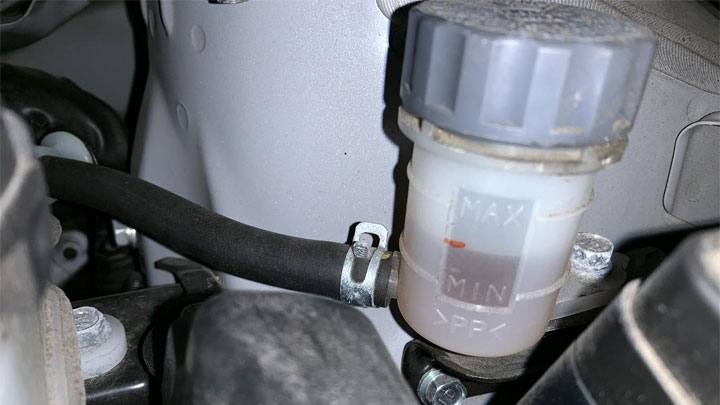
A clutch master cylinder will have low and high marks on the side of the reservoir indicating a safe volume of clutch fluid. If your clutch fluid level falls below the low mark, it’s time to top up. The reservoir cap or owner’s manual should tell you what type of fluid to use.
Once you top up your clutch fluid, keep an eye on the level. The clutch fluid level should not drop over time like you might see in brake fluid. Brake fluid level drops over time because the brake caliper piston extends further as your brake pads wear, but the clutch does not operate this way.
A chronic loss of clutch fluid is indicative of a leaking clutch master or slave cylinder.
#2 – Soft or Spongy Clutch Pedal
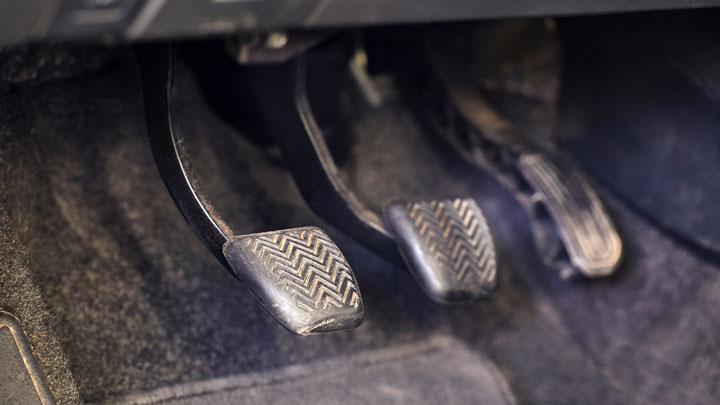
Have you noticed your clutch pedal feeling a bit lighter and easier to depress than it used to? Unlike clutch fluid, air is compressible. If you have air in the clutch master cylinder, the pedal will start to feel very soft, even if the clutch seems to work perfectly.
Try bleeding the clutch to resolve the problem. If the issue returns after a bit of time has elapsed, the clutch master cylinder may be at fault.
See Also: 5 Signs of a Slipping Clutch
#3 – Engagement Point Suddenly Changed
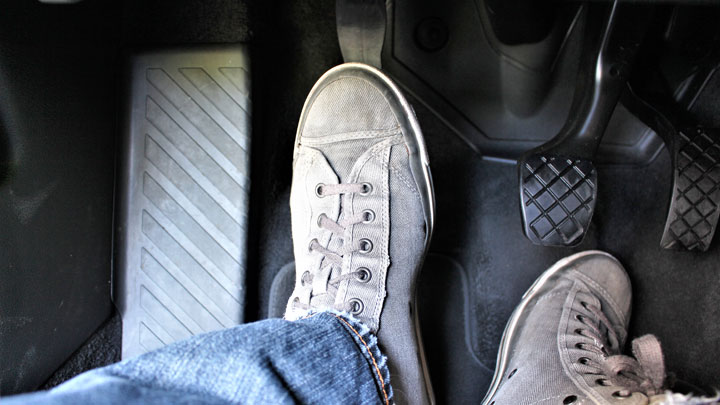
On your way to work one morning, you almost stall a couple times and can’t seem to get the car moving without jerking all over the place. You swear you know how to drive stick, maybe you’re just tired.
If this has happened to you, it might be a good idea to pop the hood and check the clutch fluid level.
If the clutch fluid reservoir is empty, there may be a tiny bit of fluid left in the lines to keep you going, but you’ll definitely notice a difference in clutch engagement, if you’re even able to get it into gear at all.
The clutch will engage right off the floor and very abruptly in this situation.
Related: How to Adjust a Clutch Pedal on a Car
#4 – Dark Clutch Fluid
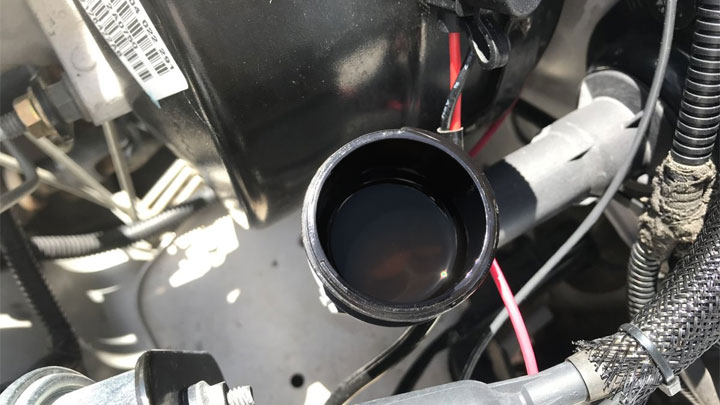
If you’ve changed your clutch fluid recently but notice it’s suddenly become very dark, one of the internal seals in the clutch master cylinder may be failing. Bits of rubber in these seals can break down and contaminate the clutch fluid, very quickly discoloring the contents of the reservoir.
If you haven’t changed your clutch fluid recently, check your owner’s manual for the recommended maintenance interval. The proper way to change clutch fluid is to flush the system with fresh fluid, bleeding the clutch lines in the process.
However, you could also try the following as a quick and dirty test for a failing seal since clutch fluid is cheap:
- Suck the old clutch fluid out of the reservoir (using something like a turkey baster, for instance).
- Top off the reservoir with fresh fluid.
- Wait a couple days to see if the new fluid turns dark.
- If your fluid gets dark within a couple days, it is likely you have a failing seal in the clutch master cylinder, especially if you exhibit any other symptoms listed above.
Clutch Master Cylinder Replacement Cost
Best places to order parts? See: 19 Best Online Auto Parts Stores
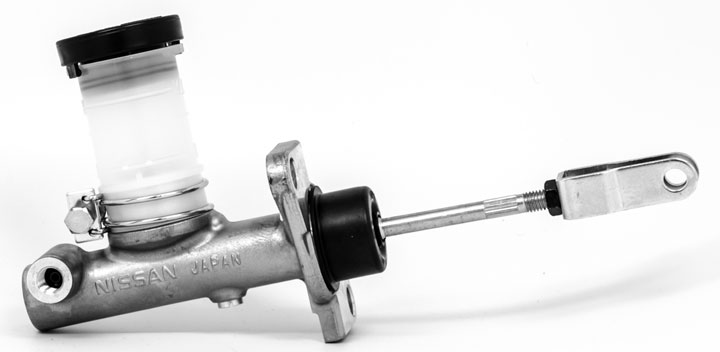
Depending on the vehicle, replacing the clutch master cylinder is often fairly cheap and easy. It is even possible for most home mechanics to tackle this job themselves.
In some vehicles, all that is needed is to buy a new clutch master cylinder, unscrew the clutch line, unbolt the clutch master cylinder from the firewall and install the new unit (reverse the procedure).
If having a professional replace your clutch master cylinder, expect to pay somewhere in the range of $180 to $420 total.
Parts will usually cost $100 to $300. It shouldn’t take them more than an hour to replace the cylinder so you’re looking at $80 to $120 for labor in most cases.
Note: It is often recommended to replace the clutch slave cylinder at the same time as the master cylinder. When one of these parts fails, it’s often the case that the other part follows suit soon after.
Some clutch master cylinders can be rebuilt to cut costs. Most units are supposed to be bench bled before installation. The clutch pedal will likely need adjustment after replacement of the clutch master cylinder. Consult your specific vehicle’s factory manual for more information.
Related: Average Clutch Replacement Cost
How a Clutch Master Cylinder Works
Modern vehicles with a manual transmission use hydraulic fluid (usually brake fluid) to transfer the movement of the clutch pedal into an actuation of the clutch fork. When you depress the clutch pedal, a rod attached to the clutch pedal assembly pushes on hydraulic fluid in the clutch master cylinder.
Since this fluid is not compressible, it is forced to travel down the clutch lines to the slave cylinder, which is attached to the clutch fork. The clutch fork forces the clutch to separate from the pressure plate and flywheel, allowing the engine and wheels to spin independently.
See Also: Common Causes of a Manual Transmission That’s Hard to Shift
- Replace the Engine or Replace the Car? (11 Factors to Consider) - Apr 11, 2024
- Plastic Piece Dragging Under Your Car? (What It Is and What To Do) - Mar 21, 2024
- Timing Belt vs Timing Chain (What’s the Difference?) - Feb 27, 2024

Hi
My clutch master cylinder is about 28mth old.
About8 mths ago my pedal went strait to the floor.
We replaced the rubbers, I noticed it had split the bottom.
About 6wks later, it did the same thing, split the rubber, two days ago, the same thing, yesterday morning did it again, within a few miles drive in town, it done it yet again.
What will cause it to split new seal?
Botton pressure seal new the spring.
Look forward to an explanation.
Thank you
I don’t know. If it were me I might replace the whole clutch master cylinder at that point.
Thanks you for sharing the knowledge to as.
very clear and good article easy to understand. Thank you
My hyundai elantra 2008 have the same problem. From last 2 years i’ve changed master cylinder 4times. Car is on 350k kms but still runs fines, the only problem is this master cylinder. The only solution is to sell the car now.
Sounds like the problem may be something other than the master cylinder.
My 2012 manual transmission Ford Feista didn’t want to down shift at all but once u shut the car if it shifts fine. Then I couldnt get it into to first.now the car When I start it just takes off and when I have the clutch in. If I hit the brake it acts like it’s gonna die
Sounds like you might need to have that looked at by a transmission shop.
Us there any problem if the original size of clutch master cylinder in suv car is 5/8″ that cylinder..then i changed to 3/4″ size of clutch cylinder
I’m not sure, I would do some research on that. If you change the size it may change brake pedal feel, travel, or effectiveness. It’s one of those things where I would be sure I understood the implications before swapping it out.
Struggling with fiat strada 2008 model how do I bleed the clutch
Bleeding the clutch is typically a similar process to bleeding the brakes. Is there a particular part of the process you are struggling with?
Very good ideas and suggestions to know what the problem is with your clutch. Congratulations to the author of the article.
It’s good to know that a difference in clutch engagement can mean a lower clutch fluid level. Last night I noticed that my clutch on my Ford truck feels more stiff than usual. I’ll be sure to take it into the shop to make sure my clutch can last longer.
Ive got a 87 ford ranger 2.9 L v6 and I can see where the clutch master cylinder is leaking fluid onto the floor. The resivor is always low or empty and the clutch goes from acting normal to engaging when it pushed to the floor and than if I come to a stop I have to throw it in neutral or it’ll die, than I have to pump the petal or turn the truck off just to get it back in first gear or reverse. Its really hard to shift gears when it does this, which is most of the time, sometimes I dont even use the clutch to upshift or downshift, I just get the rpms right and it’ll drop into gear, like flooting the gears in a tractor trailer. Ive been driving it like this for about half a year now.